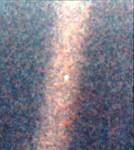The following is simply plagiarized, from Carl Sagan, but it is nonetheless quite important. Back in my insomniac elementary school days (as opposed to my insomniac graduate school days), I remember reading quite a number of his books. The non-fiction ones tended to be particularly interesting and well illustrated. These specific observations of his have always struck me as especially poignant:
We succeeded in taking that picture [from deep space], and, if you look at it, you see a dot. That’s here. That’s home. That’s us. On it, everyone you ever heard of, every human being who ever lived, lived out their lives. The aggregate of all our joys and sufferings, thousands of confident religions, ideologies and economic doctrines, every hunter and forager, every hero and coward, every creator and destroyer of civilizations, every king and peasant, every young couple in love, every hopeful child, every mother and father, every inventor and explorer, every teacher of morals, every corrupt politician, every superstar, every supreme leader, every saint and sinner in the history of our species, lived there on a mote of dust, suspended in a sunbeam.
The earth is a very small stage in a vast cosmic arena. Think of the rivers of blood spilled by all those generals and emperors so that in glory and in triumph they could become the momentary masters of a fraction of a dot. Think of the endless cruelties visited by the inhabitants of one corner of the dot on scarcely distinguishable inhabitants of some other corner of the dot. How frequent their misunderstandings, how eager they are to kill one another, how fervent their hatreds. Our posturings, our imagined self-importance, the delusion that we have some privileged position in the universe, are challenged by this point of pale light.
Our planet is a lonely speck in the great enveloping cosmic dark. In our obscurity — in all this vastness — there is no hint that help will come from elsewhere to save us from ourselves. It is up to us. It’s been said that astronomy is a humbling, and I might add, a character-building experience. To my mind, there is perhaps no better demonstration of the folly of human conceits than this distant image of our tiny world. To me, it underscores our responsibility to deal more kindly and compassionately with one another and to preserve and cherish that pale blue dot, the only home we’ve ever known.
This is an expression that I expect would be inspiring, humbling, and amazing for any human being.


It was a shame that Sagan was taken away so early. There was much more he could have contributed to human society. Dragons of Eden is still one of my all time favorites and most definitely a must read for any inquisitive being. Pure genius.
i needed that, thanks.
xo
Perspective, indeed. I had not read that. Thanks for posting it.
Richard Feynman
“There are 10^11 stars in the galaxy. That used to be a huge number. But it’s only a hundred billion. It’s less than the national deficit! We used to call them astronomical numbers. Now we should call them economical numbers.”
“If we long for our planet to be important, there is something we can do about it. We make our world significant by the courage of our questions and by the depth of our answers.”
Carl Sagan, Cosmos
Above: the first image ever taken of Earth from the surface of a planet beyond the Moon. Photographed by the Mars Exploration Rover Spirit one hour before sunrise on the 63rd Martian day, or sol, of its mission. (March 8, 2004).
“It takes nothing from the beauty and power of the image, though, to point out that it was the photographer, far more than its subject, who was isolated, and that the fragility is an illusion. The planet Earth is a remarkably robust thing, and this strength flows from its ancient and intimate connection to the cosmos beyond. To see the photo this way does not undermine its environmental relevance — but it does recast it.
…
This unfailing, uninterrupted life demonstrates that the planet is far from fragile. The living Earth is tough on scales it is hard to credit. Life has watched continents crash together and tear themselves apart; skies glowing like bright coals; tropical seas frozen into stillness: it has endured. Slaked in radiation from nearby supernovae, pummeled by asteroids, it has barely faltered and never stopped. Our civilization may be — is — out of balance with its environment; current human ways of life are frighteningly precarious. But to read the fragility of our way of life onto life itself is foolish.
Humans can kill species and diminish ecosystems. Such vandalism poses real dangers to its perpetrators, since human civilization relies on the services some of these ecosystems provide. But at the scale of the planet’s life taken as a whole it is penny-ante stuff. Humanity poses no existential risk to life on Earth, and nor will anything else for hundreds of millions of years. Rich, varied, ever changing — the Earth is all of these. Fragile it is not.”
Pale Blue Dot + 25 Years